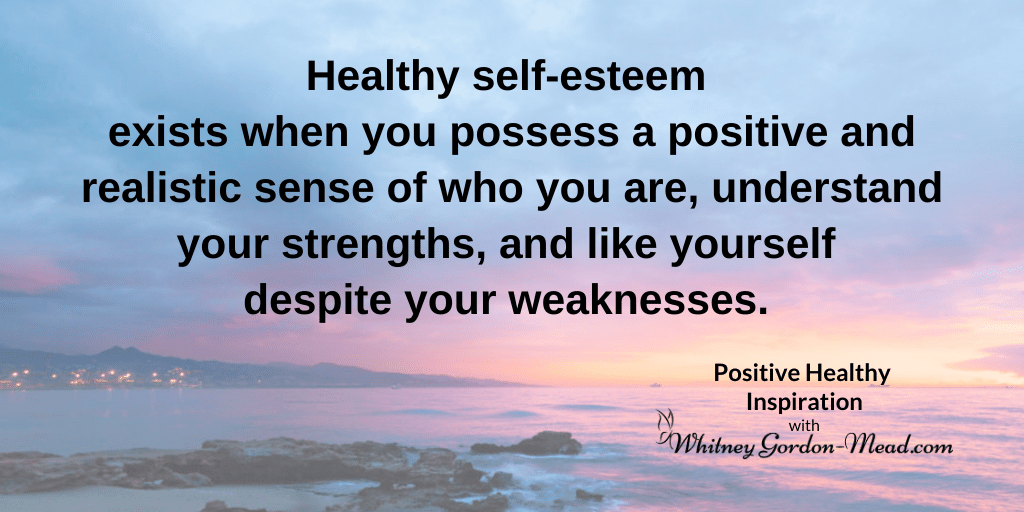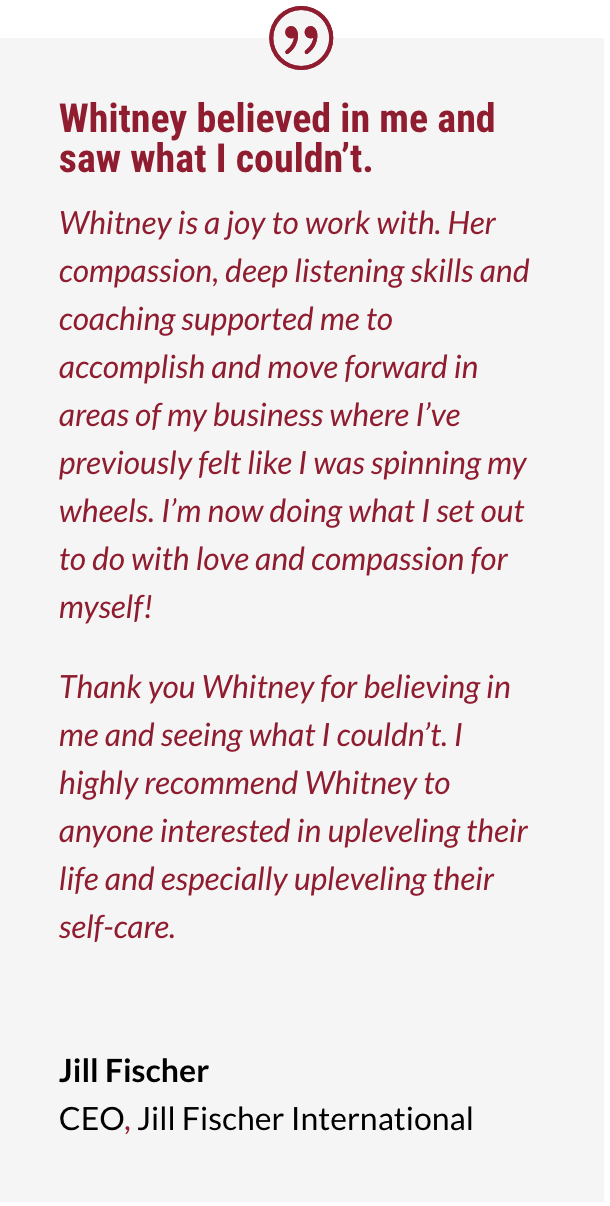Do you ever feel like you aren’t good enough?
Are you driven to achieve in order to prove that you’re enough?
The difference between healthy and low self-esteem
The word “esteem” means to regard favorably. Self-esteem is how you regard yourself. It’s your sense of self, how you rate yourself as a human being, how worthy you feel you are. Self-esteem refers to your acceptance of yourself and the value you place on yourself.
Healthy self-esteem exists when you possess a positive and realistic sense of who you are, understand your strengths, and like yourself despite your weaknesses.
On the other hand, when you have low self-esteem you are critical of yourself, focus on your negatives, and ignore your achievements. If this describes you, you’re not alone. Low self-esteem is a common challenge – regardless of age, background, or socioeconomic status.
Healthy self-esteem exists when you possess a positive and realistic sense of who you are, understand your strengths, and like yourself despite your weaknesses. Share on XTracing low self-esteem to your childhood
Low self-esteem can often be traced back to childhood. It can be common if you come from a background where you were told you weren’t good enough, were made to feel unlovable, or suffered through a traumatic event.
If you experienced any of these things growing up, it’s possible that your desire for success is driven by low self-esteem. And you might not be aware of this or willing to admit it out loud, because the outside world views you as a confident and successful woman. This could make you uncomfortable admitting that you have fears or inner doubts.
When you stop long enough to be vulnerable and acknowledge what’s true, you may see that no matter how much you succeed, it’s never enough. You’re continuously striving for the next goal. And you may begin to realize that one of the reasons you are doing this is to prove something to the outer world.
If you’re wondering how I know this…
I’ve lived it. For my first 27 years, from the time I was born until a couple of years before he died, my father showed no interest in me. So, I was driven to achieve in my efforts to prove that I was good enough, lovable enough, and worthy enough for my father’s attention. And no matter what goal I accomplished, it wasn’t enough.
Of course, this made me highly successful in life. It also led me to experience burnout. And it taught me that childhood experiences can influence your level of self-esteem.
However, it’s not unusual to develop self-esteem issues in adulthood too. Any time you go through a difficult situation, it can affect the way you see yourself. For example, if you lose your job, go through a divorce or file bankruptcy, you may internalize this experience and believe it’s your fault… that you caused this bad thing to occur.
Yet regardless of whether your experience of low self-esteem stems from childhood or adulthood, I’ve learned that there’s a lot you can do as an adult to boost your confidence.
Below are twelve ideas that you can apply to your own circumstances to overcome low self-esteem. Use what resonates with you.
Build your self-esteem by embracing these tips
1. Set boundaries
Let others know how you wish to be treated. Remove yourself from relationships and situations that cause unnecessary stress and interfere with your well-being. Instead, develop stable and mutually supportive relationships. Surround yourself with positive people, including family and friends who are encouraging and appreciate you for who you are.
2. Learn to accept compliments
If you’re fortunate enough to have positive influences in your life, listen to them when they say you’ve done a good job. If you were undeserving of the praise, you wouldn’t be getting it. So, resist the urge to dismiss compliments. Instead, smile and say, “Thank you.” Accepting compliments will help you discover what you’re good at and strengthen your self-confidence.
3. Advocate for yourself
Ask for help when you need it. Be willing to say “No.” It’s natural to feel bad about yourself when you agree to do things you don’t want to do, because you’re disrespecting yourself. So refuse requests when you genuinely don’t want to do them. Give yourself the respect and compassion you deserve.
4. Prioritize yourself
Make your mental and physical health a top priority. Eat nutritious foods, exercise regularly, and sleep well. Treat your time like a precious resource. Plan your days and block time for the activities you love. Investing in yourself helps you to stay strong and maximize your potential.
5. Embrace your individuality
You’re much more interesting than the person you pretend to be. We develop the urge to conform in elementary school. But you’re not like everyone else. You’re unique. You’ll make more friends and have more influence if you respect your unique gifts and are willing to be yourself. Authenticity is the basis of true confidence.
6. Avoid “shoulding” on yourself
If you’re constantly telling yourself, “I should have done this” or “I should have said that”, you’re focusing on things that have already happened and you’re unable to change. Remember that self-esteem is a symptom of detrimental thinking habits. Anything said or done in the past is over. You only keep those things alive with your thoughts. Instead, plan for the future. Uplift your thinking and your self-esteem will rise as well.
7. Set reasonable expectations
Accept that human beings make mistakes. If you’re unwilling to accept anything less than perfection from yourself, you’ll feel discouraged when you inevitably make a mistake. Don’t let mistakes get you down. Remember that every mistake you make is a chance to learn and grow.
8. Recognize and celebrate your accomplishments
If your self-esteem is lacking, you might spend a lot of time focusing on the negative. Instead, acknowledge your accomplishments and allow yourself to be happy. It’s okay to be proud of yourself.
9. Make a list of all your best qualities
When you have low self-esteem, you focus on the things you dislike about yourself. Instead, write down your strengths, skills, talents, and positive personality traits. Taking some time to focus on your good qualities can have a very positive effect.
10. Avoid comparing yourself to others
It can be easy to get into a habit of comparing yourself negatively to other people. Instead, remember that you are unique. And know that your self-esteem comes from within. So, you can choose how you see yourself. Choose to see an attractive, thoughtful, intelligent, and caring person.
11. Use affirmations
Affirmations are great self-esteem boosters. They show your brain what you already know you can achieve. Read affirmations on subjects of your choice or write your own. Affirmations bring positive energy into the present moment.
12. Get a life coach or a spiritual counselor
These are professionals who empower you to deepen your relationship with yourself. They partner with you to create strategies that target your unique skills and gifts. They’re like a supportive friend, only better! Because they are experts, guiding you to enhance every aspect of your life on your journey toward success, so you can maximize your full potential, reach your desired results, and attain greater fulfillment. In this day and age, it is extremely common for any successful individual to have a coach or counselor guiding them, so there’s no need to be embarrassed about seeking one out.
Embrace, honor, and love yourself to healthy self-esteem
As I’ve already mentioned, there are many factors which can cause or contribute to low self-esteem. The key to overcoming your low self-esteem is to believe in your abilities and recognize the areas where you excel, so you can start feeling good about yourself again. The above tips will help you to achieve this.
As you build your self-esteem, you’ll make sound decisions and fulfill your goals with even greater ease. You’ll know with certainty that you are lovable, capable, and worthy of dignity and respect. And you will begin to love and accept yourself for who you are.
You will understand that self-care is a vital part of loving yourself, because you deserve to feel good about yourself. And as I mentioned earlier, investing in yourself helps you to stay strong and maximize your potential.
For ways to prioritize yourself with self-care, click here to claim your FREE gift, 23 of My Favorite Self-Care Activities That Take Less Than 15 Minutes. I hope this list supports you to honor yourself and block time each day to enjoy an activity you love.
Be the first to know when there’s a new article, free gift, program, and other helpful tips that will empower you to address the areas that need attention in your life. If you aren’t already part of my online community, click here to join us.
Whitney





